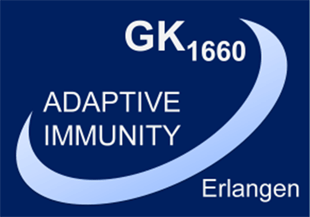DFG-Graduate School 1660 – Erlangen

The main objective of this new training grant application is to teach and foster young scientists in the field of adaptive immunity. Our research program will focus on the molecular analysis of three cell populations (Dendritic, B cells and T cells), which will contribute to our fundamental understanding how the adaptive immune response works under physiologic as well as pathophysiologic conditions.
To achieve this goal, we have recruited from 10 institutes and clinical departments at the Friedrich-Alexander University Erlangen-Nürnberg 20 research groups headed by internationally recognized experts in the field of the biology of Dendritic cells, B cells and T cells. All trainers have external funding and are experienced in graduate training. To increase the attractiveness of our program and to recruit the best students, we have developed an innovative doctoral pilot program for undergraduates with a bachelor's degree, which will lead to the Dr. rer . nat. in 4.5 years.
The program will also accept 10 doctoral students with a Master's or Diplom degree (associated graduates). In addition, we have developed for six talented medical students a doctoral training program that runs parallel with their medical school program. The doctoral students with a Bachelor's degree will first pass through a 1.5-year training program where they will receive extensive training in immunology and related disciplines, participate in three research-oriented laboratory rotations (including one at an external laboratory) and attend communication and softskills workshops. After the training period they will start their thesis with one of the participating mentors.
During their thesis the doctoral graduate and medical students will participate in the successfully tested core events and activities of the finished training grant GK592: (1) An bi-weekly doctoral "jour fixe" organized by the students , (2) subject-specific as well as interdisciplinary and softskills workshops, (3) research symposia and network meetings with members of other exttraining grants, (4 ) external laboratory visits, (5) and the guest speaker seminar series. The students will also organize seminars and workshops for the public and high school students and supervise small research projects for undergraduates.
The doctoral students will be mentored by a 3-member thesis advisory committee. To internationally position our doctoral students, they will organize the 3rd International GK Symposium on "Regulators of Adaptive Immunity" (www.lymphozyten.de/symposia). Our research and innovative training concept will not only lead to a reduction in the time required to finish a doctoral program, but it will also provide a high-quality training environment for young scientists at an internationally competitive level.
To achieve this goal, we have recruited from 10 institutes and clinical departments at the Friedrich-Alexander University Erlangen-Nürnberg 20 research groups headed by internationally recognized experts in the field of the biology of Dendritic cells, B cells and T cells. All trainers have external funding and are experienced in graduate training. To increase the attractiveness of our program and to recruit the best students, we have developed an innovative doctoral pilot program for undergraduates with a bachelor's degree, which will lead to the Dr. rer . nat. in 4.5 years.
The program will also accept 10 doctoral students with a Master's or Diplom degree (associated graduates). In addition, we have developed for six talented medical students a doctoral training program that runs parallel with their medical school program. The doctoral students with a Bachelor's degree will first pass through a 1.5-year training program where they will receive extensive training in immunology and related disciplines, participate in three research-oriented laboratory rotations (including one at an external laboratory) and attend communication and softskills workshops. After the training period they will start their thesis with one of the participating mentors.
During their thesis the doctoral graduate and medical students will participate in the successfully tested core events and activities of the finished training grant GK592: (1) An bi-weekly doctoral "jour fixe" organized by the students , (2) subject-specific as well as interdisciplinary and softskills workshops, (3) research symposia and network meetings with members of other exttraining grants, (4 ) external laboratory visits, (5) and the guest speaker seminar series. The students will also organize seminars and workshops for the public and high school students and supervise small research projects for undergraduates.
The doctoral students will be mentored by a 3-member thesis advisory committee. To internationally position our doctoral students, they will organize the 3rd International GK Symposium on "Regulators of Adaptive Immunity" (www.lymphozyten.de/symposia). Our research and innovative training concept will not only lead to a reduction in the time required to finish a doctoral program, but it will also provide a high-quality training environment for young scientists at an internationally competitive level.